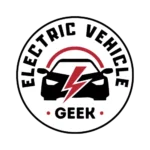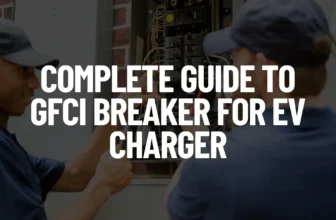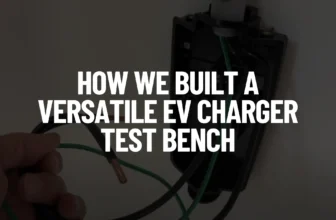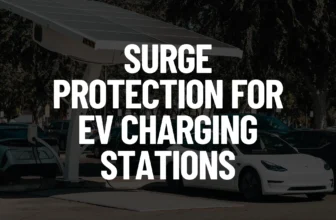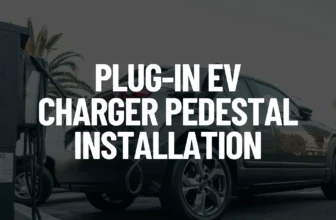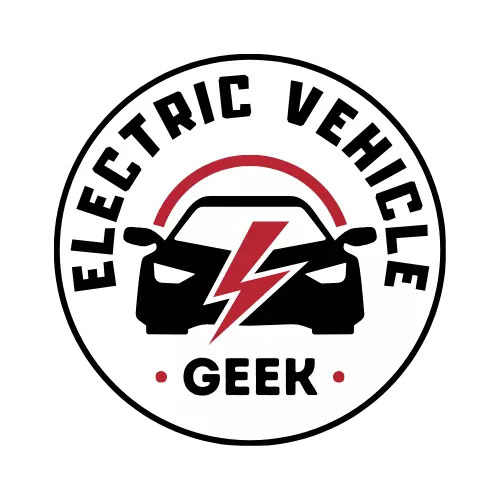A smart circuit breaker for EV charger installation not only protects your EV charger like a regular dedicated EV charger circuit breaker but also includes smart EV charging features. These features allow remote control of your electric vehicle circuit and enable tracking and gathering of data on the electric vehicle branch circuit load and usage.
A smart circuit breaker for EV chargers protects EV charger installations from overcurrent, short circuits, ground faults, overload conditions, and various electrical faults. Their ability to detect and react to these conditions by tripping helps ensure the safety and reliability of electric vehicle charger installations.
A smart circuit breaker extends its capabilities beyond basic safety functions with advanced smart EV charging features, enabling power monitoring, remote monitoring, and management of the electric vehicle branch circuit. These capabilities support EV charging via various protocols such as Wi-Fi, Zigbee, Lora, RS485, and RJ45, enhancing overall operational efficiency and control.
The diagram below shows the components of a smart Wifi circuit breaker that can be used in EV charger installations.
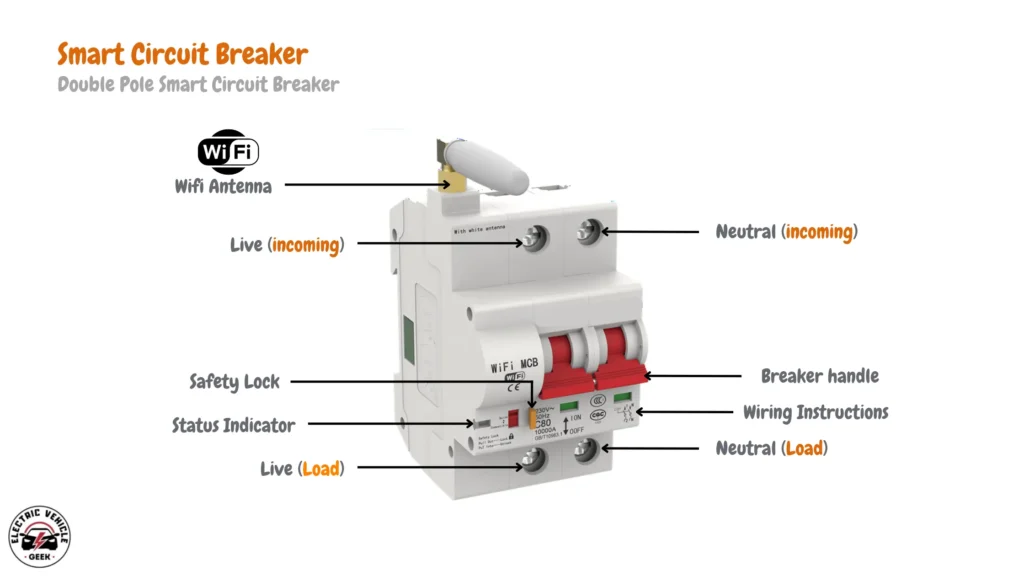
Table of Contents
Best Smart Circuit Breaker for Smart EV Charging
Choosing the right smart circuit breaker depends on factors such as the voltage rating of your EV charger installation electrical panel, the power rating of your EV charger, circuit type, physical dimensions, mounting requirements, and continuous current amperage rating.
Below, we categorize the best smart circuit breakers for EV charging based on different charging levels.
Best Smart Circuit Breaker for Level 1 EV Charger
For a Level 1 charger rated between 1.3kW and 3.8kW on a 110V/120V circuit, you’ll need a 15A or 20A single pole smart circuit breaker. Below, find recommended single pole smart circuit breakers rated at 15A and 20A for supporting these EV charger specifications.
| Circuit Breaker (Amps) | Single Pole Smart Circuit Breaker | Level 1 EV Charger Power Rating (kW) |
|---|---|---|
| 15A | Leviton 15A Plug-On Smart Standard Branch Circuit Breaker | 2.8kW |
| 20A | Leviton 20A Plug-On Smart Standard Branch Circuit Breaker | 3.8kW |
How To Install a Smart Circuit Breaker for Level 1 EV Charger (USA – NEC)
Installing a standard one-pole smart breaker involves installing a 15-amp or 20-amp smart circuit breaker to a 120V electrical panel and connecting the smart circuit breaker to the EV charger.
Steps Involved:
- Grounding the EV Charger: Connect the ground wire from the EV charger to the grounding bus in the subpanel.
- Neutral Connection: Connect the neutral wire from the EV charger to the neutral bus in the subpanel.
- Installing the Smart Breaker:
- Secure the breaker: Snap the one-pole smart breaker onto the hot bus in the subpanel.
- Connect the hot wire: Securely fasten the hot wire from the EV charger to the breaker’s lug.
- Connect to EV Charger: Connect the other end of the hot wire to the Level 1 EV charger.
Upon completion, your smart electric vehicle branch circuit should resemble the diagram below.
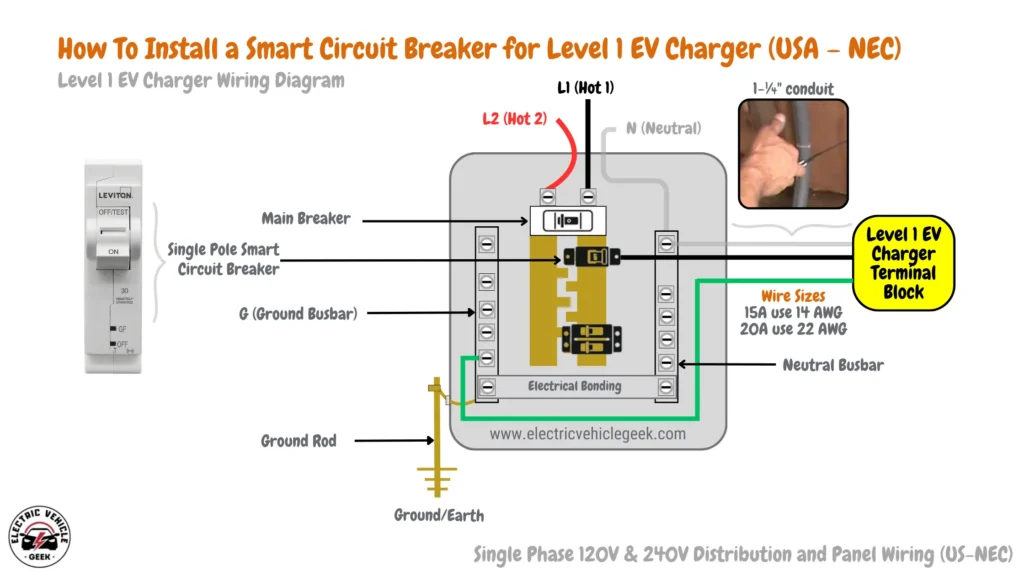
The diagram illustrates a single-pole smart circuit breaker powering a Level 1 EV charger within a 120V single-phase system. A single hot wire connects the smart circuit breaker to the charger, while neutral and ground wires connect from their respective buses in the electrical panel.
Best Smart Circuit Breaker for Level 2 EV Charger
Level 2 charging stations typically range in power output from 3.3 kW to 19.2 kW, necessitating a double pole smart circuit breaker rated between 30A and 100A.
The selection of your Level 2 EV charger smart circuit breaker depends on the power specifications of your Level EV charger. and your home electrical system set-up, below we have summarized the best Level 2 EV charger smart circuit breakers for a 240V home electrical panel set-up.
| Circuit Breaker (amps) | Double-Pole Smart Circuit Breaker | Level 2 EV Charger Power Rating (kW) |
|---|---|---|
| 30A | Leviton 30A 2-Pole Plug-On Smart Standard Branch Circuit Breaker | 5.7kW |
| 40A | Leviton 40A 2-Pole Plug-On Smart Standard Branch Circuit Breaker | 7.6kW |
| 50A | Leviton 50A 2-Pole Plug-On Smart Standard Branch Circuit Breaker | 9.6kW |
| 60A | Leviton 60A 2-Pole Plug-On Smart Standard Branch Circuit Breaker | 11.5kW |
| 100A | Walfront 100A Smart WiFi Circuit Breaker | 19.2kW |
How To Install a Smart Circuit Breaker for Level 2 EV Charger (USA – NEC)
For a Level 2 EV charger, select a double-pole smart circuit breaker rated between 30A to 100A, matching your charger’s power requirements. Ensure compatibility with your 240V electrical panel commonly used in US residential properties. Installation involves the following steps:
- Smart Circuit Breaker Installation: Secure the two-pole smart breaker to the correct A-B bus positions in the sub-panel.
- Charger Installation: Connect the charger’s ground and neutral to the respective busbar in the electrical panel. Connect the two hot wires from the smart double-pole breaker to the EV charger’s NEMA 14-50R outlet or its terminals.
At the end of the installation, your Level 2 EV charger installation with a dedicated smart circuit breaker will mirror the electric vehicle branch circuit shown below:
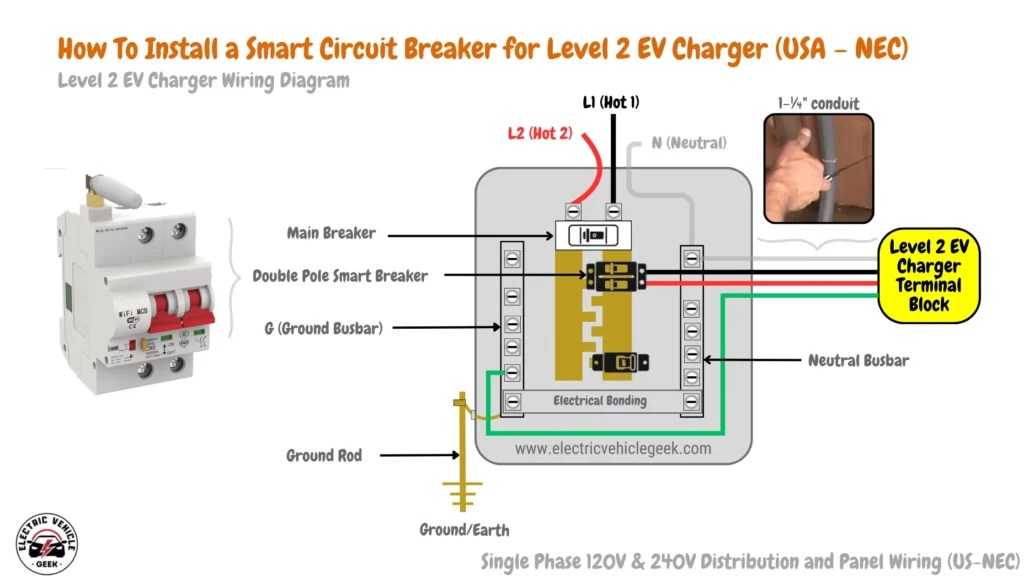
The electric vehicle branch diagram above shows a double pole smart breaker connected to a 240V distribution panel, the circuit breaker has two wires connected to it from the main circuit breaker, the two hot wires then leave the smart circuit breaker to the Level 2 EV charger, the Level 2 EV charger ground and neutral wires are connected to the ground and neutral busbar respectively.
Smart Circuit Breaker for Level 3 EV Charger
Level 3 EV chargers, with amperage ratings typically ranging from 100 amps to 400 amps, deliver rapid charging power from 50kW to 350kW. These chargers necessitate special three-phase EV charger installations uncommon in residential settings but are standard in commercial DC fast charging stations located in public areas, highways, and commercial venues.
| Circuit Breaker (amps) | Level 3 EV Charger Power Rating (kW) |
|---|---|
| 125A Smart Circuit Breaker | 50kW |
| 250A Smart Circuit Breaker | 100kW |
| 320A or 400A Smart Circuit Breaker | 150kW |
| 600A Smart Circuit Breaker | 240kW |
| 800A Smart Circuit Breaker | 300kW |
How To Install a Smart Circuit Breaker for Level 3 EV Charger (USA – NEC)
For a Level 3 EV charger, you will need a three-phase electrical power source, a compatible three-phase electrical panel, and smart circuit breakers rated 125Amps to 800amps depending on your Level 3 EV charger power rating.
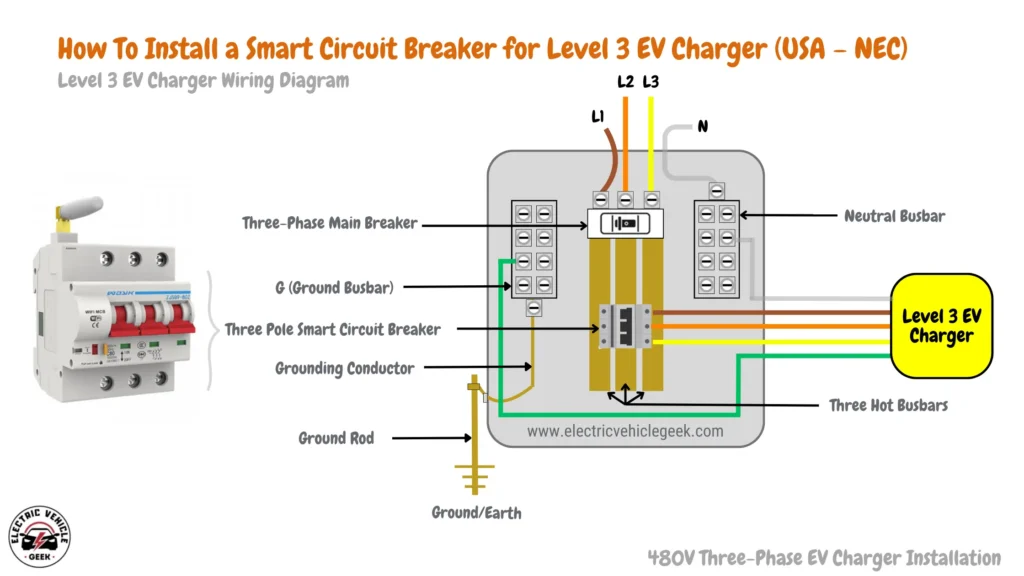
Benefits of a Smart Circuit Breaker for EV Charger
Protect EV Charger Installation Circuits
A smart circuit breaker for EV chargers functions similarly to a conventional dedicated EV charger circuit breaker. It can serve as either a dedicated EV charging circuit breaker or a specialized add-on in complex installations. In single-home installations, they can be used as dedicated EV charger circuit breakers to offer protection from surges, short circuits, overloads, and over-voltage.
In complex EV charger installations they can be used to assist dedicated EV charger circuit breakers, this ensures operational continuity, efficiency, and enhanced safety with features like overload protection and ground fault detection. Such systems are particularly beneficial in multifamily complexes or commercial settings with multiple EV charger circuits.
Smart EV Charging Features
Additionally, the smart circuit breaker provides remote and real-time EV charging monitoring of energy consumption, load management, and the status of the circuit itself. This real-time data helps users be energy efficient by understanding how much energy is being consumed and produced during charging sessions and ensures optimal usage without overloading the system especially when they have integrated renewable EV charging or bi-directional EV charging into their EV charging installation.
Furthermore, the smart breaker supports EV charging scheduling, enabling users to set specific times for charging based on their preferences or to take advantage of off-peak electricity rates. Integration with smart home systems (Amazon Alexa, Google Assistant, Apple Homekit, Samsung SmartThings, LG ThinQ, etc) and grid integration enhances convenience by allowing seamless control and coordination with other connected devices in the home environment.
EV Charging Data and Statistics.
Lastly, the smart circuit breaker offers insightful analytics on EV charging habits and usage patterns. By analyzing historical data, it provides valuable insights that can help users optimize their charging routines and make informed decisions regarding energy management. Together, these features make the smart circuit breaker not just a protective device but a key component in efficient and smart EV charging solutions.
Frequently Asked Questions
Are smart circuit breakers safe for EV charging?
Smart circuit breakers are safe for EV charging they enhance EV charging safety and offer smart EV charging features. They can replace dedicated EV charger breakers and manage continuous current in complex setups.
Can you use a smart circuit breaker on a dumb EV charger?
Yes, you can use a smart circuit breaker on a dumb EV charger that offers no smart EV charging features, and get smart EV charging features such as remote EV charging, management, and data, the smart circuit breaker operates independently so you don’t need a smart EV charger to use a smart circuit breaker.
What are the special applications of smart circuit breakers in EV charging
Smart circuit breakers upgrade Level 1 EV chargers for renewable EV charging by enabling smart features like monitoring renewable energy production and usage, as well as smart scheduling and remote management capabilities.

James Ndungu is a certified EV charger installer with over five years of experience in EVSE selection, permitting, and installation. He holds advanced credentials, including certification from the Electric Vehicle Infrastructure Training Program (EVITP) and specialized training in EV charging equipment and installation, as well as diplomas in EV Technology and Engineering Fundamentals of EVs. Since 2021, James has tested dozens of EV chargers and accessories, sharing expert insights into the latest EV charging technologies.
